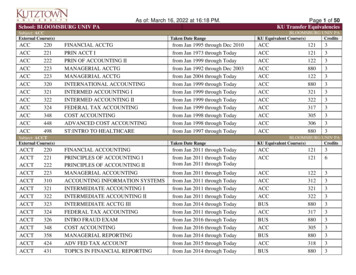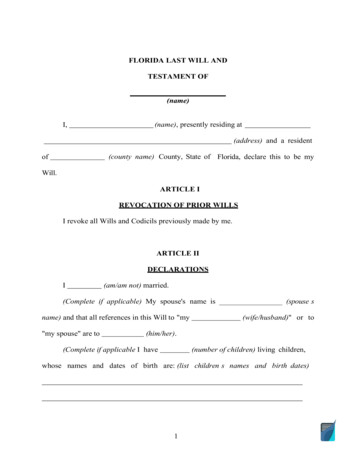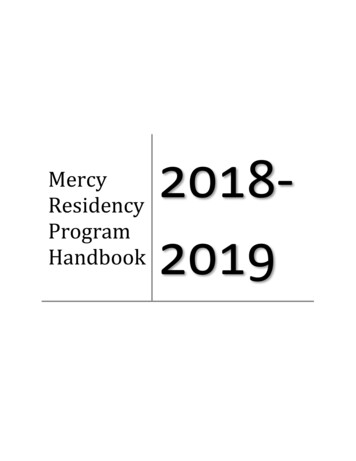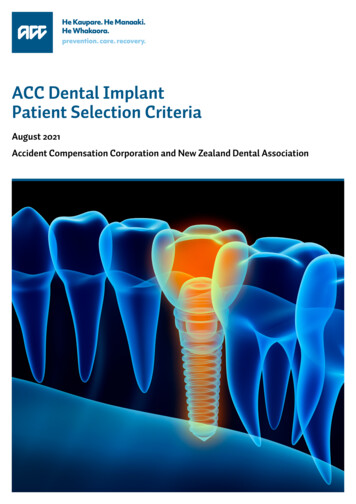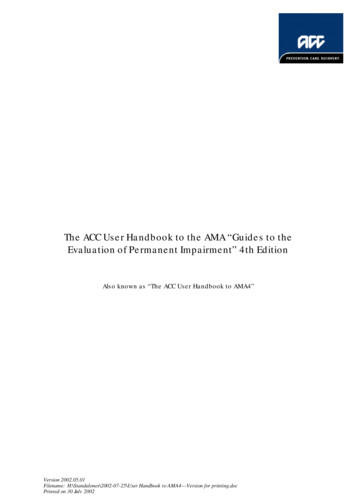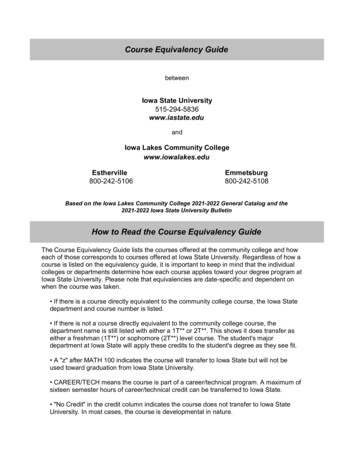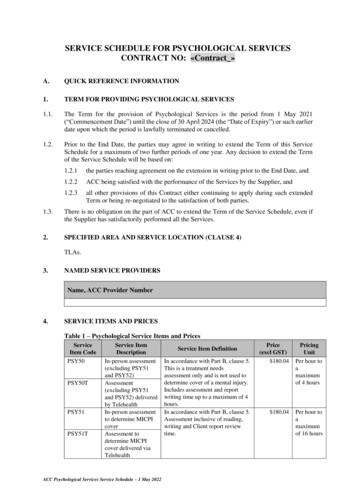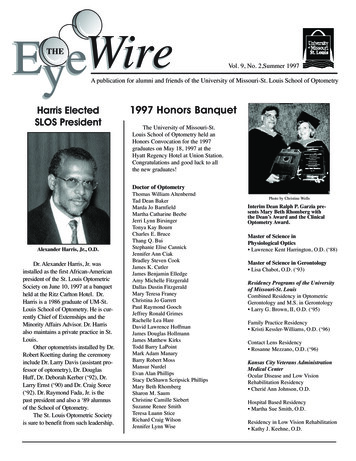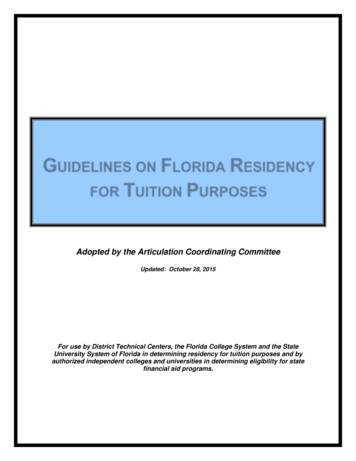
Transcription
GUIDELINES ON FLORIDA RESIDENCYFOR TUITION PURPOSESAdopted by the Articulation Coordinating CommitteeUpdated: October 28, 2015For use by District Technical Centers, the Florida College System and the StateUniversity System of Florida in determining residency for tuition purposes and byauthorized independent colleges and universities in determining eligibility for statefinancial aid programs.
TABLE OF CONTENTSSECTIONPAGE NUMBER1.0INTRODUCTION1.1Residency Statute .11.2Residency Rules/Regulation.11.3Residency Guidelines .12.0BASIC PROVISIONS2.1Residency for Tuition Purposes .22.2Physical Presence vs. Legal Residence .22.3Requisite Intent .32.4Exceptions/Qualifications .33.0DETERMINATION OF DEPENDENT OR INDEPENDENT3.1Definitions .63.2Process/Standards for Proving Independent Status .74.0PROCEDURES FOR INITIAL CLASSIFICATION4.1Residency Declaration.94.2Non-Resident Claim .94.3Transfers from Florida Public Higher EducationInstitutions .94.4Transient Students .94.5Non-Degree Seeking Students .94.6Documentary Evidence .104.7Information Resources .115.0PROCEDURES FOR RECLASSIFICATION5.1Reclassification Application .125.2Documentary Evidence .126.0MILITARY ISSUES6.1Definitions .136.2Residency Protections and Exceptions/Qualificationsfor Military Personnel .136.3Information Resources .147.0IMMIGRATION & INTERNATIONAL STUDENT ISSUES7.1Definitions and Eligibility for Residency forTuition Purposes .157.2Documentary Evidence for Individuals withNon-Immigrant Visas .157.3Linkage Institutes .15Exhibit 7-1: Florida Linkage Institutes . 167.4Latin American or Caribbean Students .17i
8.0APPEALS PROCESS FOR RESIDENCY DETERMINATIONS8.1Institutional Appeals Process.188.2Role of Department of Education & Board ofGovernors’ Staff .189.0STATEWIDE RESIDENCY COMMITTEE9.1Purpose and Structure of the Committee .19APPENDICESAPPENDIX A – FREQUENTLY ASKED QUESTIONS .A-1APPENDIX B- SUMMARY OF RESIDENCY PROVISIONS .B-1APPENDIX C – DOCUMENTATION FOR ELIGIBLE ALIENS . C-1Exhibit C-1: Overview of Documentation for Eligible AliensAPPENDIX D – SAMPLE DOCUMENTATION FOR WRONGFUL INCARCERATION .D-1APPENDIX E – SAMPLE DOCUMENTATION FROM THE DEPARTMENT OFJUVENILE JUSTICE E-1ii
SECTION 1.0 – INTRODUCTIONThe policy regarding residency for tuition purposes in Florida is composed of severallayers, including state statute, rule and regulation of the two higher education governing boardsin Florida, and statewide guidelines developed by college and university administrators inconjunction with the Statewide Residency Committee, the Florida Department of Education, andthe State University System of Florida Board of Governors (Board of Governors). All residencydeterminations are made by the postsecondary institution. For purposes of this manual andaccording to section (s.) 1009.21(1)(c), Florida Statutes (F.S.), “Institution of higher education(IHE)” means any charter technical career center as defined in s. 1002.34, career centeroperated by a school district as defined in s. 1001.44, Florida College System institution asdefined in s. 1000.21(3), or state university as defined in s. 1000.21(6).1.1Residency StatuteSection 1009.21,F.S., outlines the broad legal parameters for establishing residency fortuition purposes in Florida public higher education institutions. Additionally, students atindependent higher education institutions in Florida who want to qualify for state financial aidprograms (e.g., Bright Futures, Florida Resident Access Grant) must meet its provisions. It isthe highest level of authority regarding residency as established by the Florida Legislature. Thisstatute also provides authority for the State Board of Education and the Board of Governors toestablish rule and regulation related to residency for tuition purposes.Click link below for the full text of the residency cfm?App mode Display Statute&Search String &URL 1000-1099/1009/Sections/1009.21.html1.2Residency Rules/RegulationThe State Board of Education adopted Rule 6A-10.044 and the Board of Governorsadopted regulation 7.005 relating to residency for tuition purposes. Revisions are considered bythe Articulation Coordinating Committee (ACC). The Statewide Residency Committee, asubcommittee of the ACC, proposes changes to the rule and regulation based on feedback fromdistrict technical centers, Florida College System institutions, universities, and independentinstitutions. The residency rule and regulation provide further detail regarding the process andrequirements for residency. However, they do not function so as to modify or conflict with any ofthe broader requirements in statute. The State Board of Education also has a rule related toFlorida residency as a requirement for the receipt of state student aid. Click below for the fulltext of the rules and regulation.State Board of Education Rule 6A-10.044Board of Governors Regulation 7.005:State Board of Education Rule 6A-20.0031.3Guidelines on Residency for Tuition PurposesThis Guidelines on Residency for Tuition Purposes was prepared by the ACC to assistFlorida public IHE administrators in implementing s. 1009.21, F.S.; Rules 6A-10.044 and 6A20.003, Florida Administrative Code; and the Board of Governors Regulation 7.005. Theguidelines, as maintained by the Statewide Residency Committee, are used to assist in thedetermination of residency status for tuition purposes by Florida public IHEs.1
SECTION 2.0 – BASIC PROVISIONS2.1Residency for Tuition PurposesU.S. citizens, lawful permanent residents, and certain non-U.S. citizens as describedbelow may be classified as a Florida resident for tuition purposes provided legal residence hasbeen established in the State for at least 12 consecutive months immediately prior to the firstday of classes of the term for which Florida residency is sought.Pursuant to section 1009.21 (2)(d), F.S., a dependent student who is a US citizen maynot be denied classification as a resident for tuition purposes based solely upon the immigrationstatus of his or her parent.2.2Physical Presence vs. Legal ResidenceIt is important to note that living or attending school in Florida is not tantamount toestablishing a legal residence for tuition purposes. Maintaining a legal residence in Floridarequires substantial physical presence as a condition. However, absolute physical presence isnot required. For example, a person might take vacations outside Florida without altering his/herresidency status. Finally, in some circumstances, a person may leave Florida to work or attendschool temporarily in another state and still remain eligible for residency. Eligibility in thesecircumstances depends on the extent to which the absentee Florida resident maintains Floridalegal ties and does not establish ties with another state.The statute addresses certain family situations as related to legal residency.particular: If a dependent child has been residing continuously with a legal residentadult relative other than the parent for at least 3 years immediately prior tothe first day of classes of the term which Florida residency is sought, thedependent child may provide documentation from the adult relative or fromthe parent. Both the dependent child and the adult relative or the parentmust meet the consecutive 12 month legal residence requirement [s.1009.21 (2)(b), F.S.]. The legal residence of a dependent child whose parents are divorced,separated, or otherwise living apart will be considered Florida if eitherparent is a legal resident of this State – regardless of who claims thedependent individual for federal income tax purposes. [s. 1009.21(2)(c),F.S.] For a dependent child, the legal residence of his/her parents is prima facieevidence (i.e., evidence that establishes a fact if uncontested) of the child’slegal residence; however, the evidence may be reinforced or rebutted,relative to the age and general circumstances of the dependent child, bythe other evidence of legal residence required of or presented by thedependent child. [s. 1009.21(4), F.S.] For a dependent child, the legal residence of his/her parents who aredomiciled outside this state is not prima facie evidence (i.e., evidence thatestablishes a fact if uncontested) of the child’s legal residence if that childIn2
has lived in this state for 5 consecutive years prior to enrolling or reregistering at a higher education institution. [s. 1009.21(4), F.S.]2.3 A person who physically resides in the state may be classified as aresident for tuition purposes if he or she marries a person who meets the12-month requirement and who is a legal resident. [s. 1009.21(5), F.S.]. A person who is classified as a nonresident for tuition purposes and whomarries a legal resident of the state or marries a person who becomes alegal resident of the state may, upon becoming a legal resident of thestate, become eligible for reclassification as a resident for tuition purposesupon submitting evidence of his or her own legal residency in the state,evidence of his or her marriage to a person who is a legal resident of thestate, and evidence of the spouse’s legal residence in the state for at least12 consecutive months immediately preceding the application forreclassification. [s. 1009.21(6)(d), F.S.] An individual shall not lose his or her resident status solely by reason ofhis/her service or parent’s service in the Armed Forces outside this state.[s. 1009.21(7), F.S.] For individuals who have been classified properly as residents for tuitionpurposes but who, while enrolled, lose resident tuition status becausehe/she or his/her parents establish domicile or legal residence elsewhere,shall have the benefit of in-state tuition for a 12-month grace period(extended to the end of the term in which the 12 months is reached). [s.1009.21(8), F.S.]Requisite IntentAs provided by s. 1009.21(2)(a)2, F.S., it is imperative that the required 12 monthqualifying period be for the purpose of maintaining a bona fide domicile rather than for thepurpose of maintaining a mere temporary residence or abode incident to enrollment in a Floridapublic IHE.2.4Exceptions/QualificationsStatutory Exceptions and Qualifications. Section 1009.21, F.S., permits certain applicantswho do not meet residency requirements to be classified as Florida residents for tuitionpurposes.The institution will require documentation in support of the following exceptions;however, the student does not have to show 12 months of residence in Florida prior toqualifying. These exceptions and qualifications categories are as follows:1. Persons who were enrolled as Florida residents for tuition purposes at aFlorida public IHE, but who abandon Florida domicile and then re-enroll inFlorida within 12 months of the abandonment – provided that he/shecontinuously maintains the re-established domicile in Florida during theperiod of enrollment. (This benefit only applies one time.) [s. 1009.21(9),F.S.].3
2. Active duty members of the Armed Services of the United States residingor stationed in Florida (and spouse/dependent children) and active drillingmembers of the Florida National Guard [s. 1009.21(10)(a), F.S.]; or militarypersonnel not stationed in Florida whose home of record or state of legalresidence certificate, DD Form 2058, is Florida (and spouse/dependentchildren). [s. 1009.21(2)(a), F.S.].3. Active duty members of the Armed Services of the United States and theirspouses/dependent children attending a public college or university within50 miles of the military establishment where they are stationed, if suchmilitary establishment is within a county contiguous to Florida. [s.1009.21(10)(b), F.S.].4. United States citizens living on the Isthmus of Panama, who havecompleted 12 consecutive months of college work at the Florida StateUniversity Panama Canal Branch, and their spouses and dependentchildren. [s. 1009.21(10)(c), F.S.].5. Full time instructional and administrative personnel employed by the Stateof Florida public school system and Florida public IHE (andspouse/dependent children).See Appendix A, Frequently AskedQuestions, for definition of instructional and administrative personnel. [s.1009.21(10)(d), F.S.].6. Students from Latin America and the Caribbean who receive scholarshipsfrom the federal or state government. The student must attend, on a fulltime basis, a Florida public IHE. See Section 7.0, Immigration andInternational Student Issues, for more information on the qualifyingscholarships. [s. 1009.21(10)(e), F.S.].7. Southern Regional Education Board's Academic Common Market graduatestudents attending Florida's state universities. [s. 1009.21(10)(f), F.S.].8. Full-time employees of state agencies or political subdivisions of the statewhen the student fees are paid by the state agency or political subdivisionfor the purpose of job-related law enforcement or corrections training. [s.1009.21(10)(g), F.S.].9. McKnight Doctoral Fellows and Finalists who are United States citizens. [s.1009.21(10)(h), F.S.].10. United States citizens living outside the United States who are teaching ata Department of Defense Dependent School or in an AmericanInternational School and who enroll in a graduate level education programwhich leads to a Florida teaching certificate. [s. 1009.21(10)(i), F.S.].11. Active duty members of the Canadian military residing or stationed in thisstate under the North American Air Defense (NORAD) agreement, andtheir spouses and dependent children, attending a public communitycollege or university within 50 miles of the military establishment wherethey are stationed. [s. 1009.21(10)(j), F.S.].4
12. Active duty members of a foreign nation's military who are serving asliaison officers and are residing or stationed in this state, and their spousesand dependent children, attending a community college or state universitywithin 50 miles of the military establishment where the foreign liaisonofficer is stationed. [s. 1009.21(10)(k), F.S.].13. Qualified beneficiaries under the Stanley G. Tate Florida Pre-Paid CollegeProgram per s. 1009.98, F.S. (Pre-Paid ID Card Required). [s.1009.98(2)(b)1, F.S.].14. Linkage Institute participants receiving partial or full exemptions from s.1009.21, F.S., based on criteria approved by the Florida Department ofEducation per s. 288.8175(5), F.S., which establishes linkage institutesbetween postsecondary institutions in this state and foreign countries. SeeSection 7.0, Immigration and International Student Issues, for moreinformation on Linkage Institutes. [s. 288.8175(5), F.S.].5
SECTION 3.0 – DETERMINATION OF DEPENDENT OR INDEPENDENT3.1DefinitionsThe determination of dependent or independent status is important because it is thebasis for whether the student has to submit his/her own documentation of residency (as anindependent) or his/her parent’s or guardian’s documentation of residency (as a dependent).Independent Student. A student who meets any one of the following criteria shall beclassified as an independent student for the determination of residency for tuition purposes:1. The student is 24 years of age or older by the first day of classes of the term for whichresidency status is sought at a Florida institution.2. The student is married.3. The student has children who receive more than half of their support from the student;4. The student has other dependents who live with and receive more than half of theirsupport from the student.5. The student is a veteran of the United States Armed Forces or is currently serving onactive duty in the United States Armed Forces1 or National Guard or Reserves forpurposes other than training.6. At any time since the student turned age 13, where both of the student’s parents aredeceased, or the student is or was (until age 18) one of the following:(a) a ward/dependent of the court or(b) in foster care.7. The student is determined an unaccompanied homeless youth by a school districthomeless liaison, or by a staff member of an emergency shelter or transitional housingprogram.8. The student is working on a master’s or doctoral degree during the term for whichresidency status is sought at a Florida institution.1The U.S. Armed Forces consist of the U.S. Air Force, the U.S. Army, the U.S. Coast Guard, theU.S. Marine Corps and the U.S. Navy.Evidence that the student meets one of these criteria will be requested by the higher educationinstitution.A student who does not meet one of the criteria outlined in section 3.1 may beclassified as an independent student only if he or she submits documentation that he or sheprovides more than fifty (50) percent of the cost of attendance for independent, in-statestudents as defined by the institution.Dependent Student. A student, whether or not living with his or her parent, who iseligible to be claimed by his or her parent under the federal income tax code shall be classifiedas a dependent student.Parent. “Parent” means either or both parents of a student, any guardian of a student,or any person in a parental relationship to the student.” [s. 1009.21(1)(f), F.S.]6
In order to be considered a “qualifying child” or “dependent” for federal income tax codepurposes, the following must be true:1. The child must be your son, daughter, or stepchild, foster child, brother, sister, half-brother,half sister, stepbrother, stepsister, or a descendent of any of them.2. The child must be:(a) under age 19 at the end of the year and younger than you (or your spouse, if filingjointly),(b) under age 24 at the end of the year and a full-time student and younger than you (oryour spouse, if filing jointly), or(c) any age if permanently and totally disabled.3. The child must have lived with you for more than half of the year subject to IRS exceptions.4. The child must not have provided more than half of his/her own support for the year.5. The child is not filing a joint return for the year (unless that joint return is filed only as a claimfor refund of withheld income tax or estimated tax paid).Some individuals cannot be claimed as a dependent. Generally, a married person cannot beclaimed as a dependent if they file a joint return with their spouse. Also, to claim someone as adependent, that person must be a U.S. citizen, U.S. resident alien, U.S. national or resident ofCanada or Mexico for some part of the year. There is an exception to this rule for certainadopted children. See IRS Publication 501, Exemptions, Standard Deduction, and FilingInformation for additional tests to determine who can be claimed as a dependent.3.2Process/Standards for Proving Independent StatusDependent or independent status will be based on a copy of a student's or his/herparent’s most recent tax return or other documentation as appropriate.This otherdocumentation includes information submitted on or in conjunction with the AdmissionsApplication, on the Residency Statement, or on other supporting evidence collected by thehigher education institution. The college or university is not required to collect tax returns forthose students who are under the age of 24 and claim to be dependent on the ResidencyDeclaration.The following documents are examples of evidence that must be provided to the highereducation institution to prove the student’s status as an independent if the student is under theage of 24 by the first day of classes of the term: Marriage certificate, insurance information showing marital status, most recent taxreturn showing marital status;Tax returns showing support of children or other dependents who live with andreceive more than half of their support from the student;Military discharge documents;Legal documents showing student is a ward/dependent of the courts; orDocumentation showing that the student provides more than fifty (50) percent ofhis/her support for the year (examples may include: tax return, W-2 form, pay stubs,employer earnings verification).When tax returns are collected for the purpose of proving independent status by virtue ofproviding support to others, the social security numbers and income figures should be blackedout as the only relevant information on this form relates to whether or not an exemption has7
been claimed for the student. (The collection of income tax returns poses concerns regardingrecord retention, identity theft, and financial aid verification requirements.)When tax returns are collected for the purpose of proving independent status by virtue ofproviding more than fifty (50) percent of his/her support for the year, the social security numbershould be blacked out. However, the income information must be provided to show that thisrequirement has been met.8
SECTION 4.0 – PROCEDURES FOR INITIAL CLASSIFICATIONInitial classification applies to the following individuals:1. Those submitting an application for first-time enrollment at a Florida public IHE;2. Those submitting an application which is considered a “new” application and results in achange in status (e.g., undergraduate to graduate); and3. Those submitting an application for readmission after a period of non-enrollment. [Note:A student previously classified as a non-resident at that institution may be required torequest reclassification as part of their re-admission process.]4.1Residency DeclarationThe Residency Declaration (formerly known as the Residency Affidavit) should be part ofany Florida public IHE admissions application, regardless of program (e.g., degree or nondegree seeking). Institutions should use the common residency form approved by theStatewide Residency Committee and the Articulation Coordinating Committee. The ResidencyDeclaration should be completed upon admission to determine residency for tuition purposes.Students who provide incomplete documentation will not be classified as a resident for tuitionpurposes.A secure PIN may be accepted as an electronic signature for the ResidencyDeclaration.For students in Florida’s independent colleges and universities, the ResidencyDeclaration should be completed as a part of the financial aid process.4.2Non-Resident ClaimNon-resident for tuition purposes is defined as a person who does not qualify for the instate tuition rate. If a student indicates “non-resident” on the Residency Declaration, there is norequirement to “prove” such status or to submit supporting documentation. The student isautomatically considered a non-Florida resident for tuition purposes.4.3Transfers from Florida Public IHEsPursuant to s. 1009.21(11), F.S., once a student has been classified as a resident fortuition purposes, a Florida public IHE to which the student transfers is not required to reevaluatethe classification unless inconsistent information suggests that an erroneous classification wasmade or the student’s situation has changed. However, the student must have attended theinstitution making the initial classification within the last 12 months and the residencyclassification must be noted on the transcript.4.4Transient StudentsResidency status for Transients Students should be determined by the home or parentinstitution as shown on the Transient Student Form. Additional documentation is not requiredunless evidence which contradicts the residency status is submitted.4.5Non-Degree Seeking StudentsNon-degree seeking students are subject to the same residency requirements andstandards as degree seeking students.9
4.6Documentary EvidenceIf an applicant qualifies for a residency exception or qualification, then appropriatedocumentation must be submitted to evidence entitlement to that exception or qualification.Such evidence is generally specific to the type of residency exception or qualification beingclaimed by the applicant.If an applicant does not qualify for a residency exception or qualification, he/she willhave to submit documentation that he/she (or a parent if a dependent) has been a Floridaresident for at least 12 consecutive months prior to the first day of classes for which the studentis enrolling. At least two of the following documents must be submitted, with dates thatevidence the 12-month qualifying period. At least one of the documents must be from the FirstTier. As some evidence is more persuasive than others, more than two may be requested. Nosingle piece of documentation will be considered conclusive.First Tier (at least one of the two documents submitted must be from this list)1. A Florida voter’s registration card.2. A Florida driver’s license.3. A State of Florida identification card.4. A Florida vehicle registration.5. Proof of a permanent home in Florida which is occupied as a primary residence by theindividual or by the individual’s parent if the individual is a dependent child.6. Proof of a homestead exemption in Florida.7. Transcripts from a Florida high school for multiple years (2 or more years) if the Florida highschool diploma or GED was earned within the last 12 months.8. Proof of permanent full-time employment in Florida for at least 30 hours per week for aconsecutive 12-month period.Second Tier (may be used in conjunction with one document from First Tier)1. A declaration of domicile in Florida.2. A Florida professional or occupational license.3. Florida incorporation.4. A document evidencing verifiable family ties to a Florida resident, as defined by tuition purposes.5. Proof of membership in a Florida-based charitable or professional organization.6. Any other documentation that supports the student’s request for resident status, including, butnot limited to, utility bills and proof of 12 consecutive months of payments; a lease agreementand proof of 12 consecutive months of payments; or an official state, federal, or court documentevidencing legal ties to Florida.Examples of documents that may not be usedHunting/fishing licensesLibrary cardsShopping club/rental cardsBirth certificatePassportSocial Security CardFlorida Concealed Weapons permitInsurance Card10
Other Approved Processes for DocumentationFor students in state custody, the Department of Juvenile Justice (DJJ) may facilitate residencydeterminations by providing the college or university with documentation evidencing parental orlegal guardian residence in Florida for the qualifying period. The DJJ Address Verification Formis acceptable documentation for residency determinations in conjunction with additionalinformation that demonstrates the parent or legal guardian has maintained legal residence inthis state for at least 12 consecutive months prior to the first day of classes of the term for whichresidency status is sought (for example see Appendix C).Students who have tuition and fees waived or exempted according to the following sections ofFlorida Statutes shall be classified as Florida residents and shall not be required to submitadditional residency documentation for tuition purposes for the duration of the exemption orwaiver eligibility period: S. 112.19(3), F.S.: Dependents or spouses of law enforcement, correctional, orcorrectional probation officers killed in the line of duty, S. 112.191(3), F.S.: Dependents or spouses of firefighters killed in the line of duty, S. 112.1915(3)(d), F.S.: Dependents or spouses of teacher or school administratorskilled or injured in the line of duty, S. 961.06(1)(b), F.S.: Wrongful incarceration (for example documentation seeAppendix D), S. 1009.25(1)(c), F.S. and (d): Custody of Department of Children and Families, inthe care of a relative or adopted from the Department of Children and Families, and S. 1009.25(1)(f), F.S.: HomelessAfter eligibility for the waiver or exemption has expired, the student must be reclassified as aFlorida resident for tuition purposes to continue receiving in-state tuition benefits.4.7Information ResourcesDriver and Vehicle Information Database (DAVID) – Access to DAVID may be requested by aFlorida public IHE, exclusively for the purpose of verifying driver’s license and vehicleregistration histories for students so as to establish residency for tuition purposes. Informationmay be accessed at http://www.flhsmv.gov/courts/david/.11
SECTION 5.0 – PROCEDURES FOR RECLASSIFICATION5.1Reclassification ApplicationA student who is classified as out-of-state and wants to request “reclassification” to instate status must complete a Residency Declaration at the Florida public IHE and submit to theappropriate office for consideration prior to the term for which reclassification is sought.5.2Documentary E
has lived in this state for 5 consecutive years prior to enrolling or re-registering at a higher education institution. [s. 1009.21(4), FS.] A person who physically esides in the state may be classified as a r resident for tuition purposes if he or she marries a person who meets the 12-month requirement and who is a legal resident. [s. 1009.21 .
